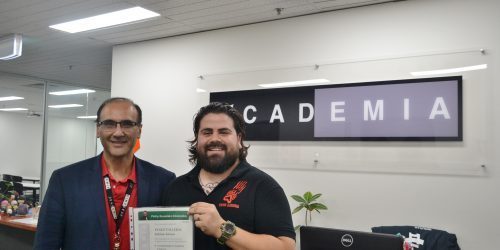5 mistakes to avoid while studying an English course in Melbourne

One of the best ways to improve your English is to use it – luckily, when you study in Australia, you will have plenty of opportunities to do just that!
Using your English skills every day when you go to the shops or navigate the city builds on the content of our English courses in Melbourne, and can help you improve your English.
However, that isn’t all you can do.
If you want to improve your English while studying in Melbourne, we’ve got just the thing for you – or in this case, things you shouldn’t do!
The following “don’ts” will help you become a well-rounded English speaker, keep you focused on your goals, and gain more confidence when speaking this language!
1) Don’t just focus on improving your everyday English
While you study in Australia, you will have to use your reading, writing and listening skills every day – however, a lot of the everyday English you will use while living here is for simple things like:
- Reading menus
- Shopping
- Engaging in everyday conversation
While using your English every day is a great way to improve it, this type of general English isn’t the only way you’ll practice – especially if your goals need more advanced or academic English skills.
For example, you might be learning English to apply for a job or enter an Australian university.
While conversational English is great, you’ll also need to find ways to use (and practice) more advanced English skills.
For example, it might help you to:
- Read your news in English
- Turn subtitles off when watching something in English
- Join English language forums
Strategies like this can “push you out of your comfort zone” as we say in English (to challenge you and help build your confidence), giving you an opportunity to practice more advanced skills.
2) Don’t focus on memorising
For a lot of people, their idea of learning English involves memorising new words.
While memorisation is an important part of learning English and can help you if you have a test tomorrow, relying completely on memorisation is not the best tactic.
Memorisation works best as a short-term technique. However, to move the content from your short-term memory into long-term memory, it needs constant repeating.
This can take a lot of time, especially when there are more effective ways of remembering new words and grammar rules!
Each person learns differently, so naturally the best technique will vary from person to person. The best way is to be open to a range of learning tactics, and find out which works most effectively for you!
3) Don’t JUST focus on the exact meaning of words – think about context, too!
It’s just as important to understand the general meaning of a sentence or word than the specific details!
A lot of students may find themselves spending too much time focusing on understanding every single word and getting the exact meaning of a sentence.
The problem is that from language to language, direct translation isn’t always accurate – and it can be terribly time-consuming, too.
In the real world, you won’t be able to hit the pause button to figure out what someone is saying.
That’s why in conversation it’s often better to aim to understand the general meaning of a sentence – this way, you can keep the conversation flowing (without having to translate the literal meaning of each word – which can often result in some very wrong – and hilarious – answers!)
4) Don’t forget about “root words”
English is a bit of a strange mixture, with many inconsistent rules and spelling that sometimes doesn’t make any sense – however, there are a couple of rules that you can rely on to improve your understanding.
One of these is by learning root words.
A lot of English roots come from a similar origin.
Not only does this help with spelling, but a lot of words from the same root also share meanings – something you can use to help understand a sentence or phrase:
- Oct comes from “octo”, the Latin word for 8 – any word that starts with “oct” usually involves eight of something (e.g. octagon or octopus)
- Mono is Greek and means “one”, “only”, or “single” – so one of something (e.g. monogamy, monotonous, monorail)
- Derm also comes from Greek and means “skin” (which is why skin care doctors are called dermatologists, a skin condition is called dermatitis, and a layer of your skin called the dermis!)
These are only a handful of the root words that exist in the English language – here’s a list with more of them if you’re interested in learning.
Learning some common roots can help you group certain words together, like we did in our examples above, and recognise them (and their meaning!) faster.
It is also interesting to learn about the origins, history, and common link between such words!
5) Don’t give up!
Sometimes, you might feel that you aren’t learning quickly enough, or you’re really feeling challenged.
When this happens, it’s important to stay positive – you’ll get there in the end as long as you stay motivated and don’t give up!
And remember – if you’re finding it challenging, it just means you’re progressing further each and every day, learning new words, getting a better grasp of vocabulary, and improving your pronunciation!
If you find yourself losing motivation or finding it hard to stay focused, we recommend using strategies like:
- Setting goals for yourself
- Being proud and celebrating your successes
- Not focusing on when you get things wrong (and instead learning from it)
- Giving yourself a reward every now and then
These are small things, but they can be a big help in keeping you motivated, focused, and excited to learn!
One of the biggest mistakes students make? Choosing the wrong English course in Melbourne
It’s important that you choose an English course offered by an institution that you can trust to provide a quality education.
However, it’s even more important that you choose an English course in Melbourne that’s right for your goals!
Everyone learns English for a different reason. For some, it’s to make their life in Australia easier. For others, it’s to achieve a specific goal, like immigrating.
In many cases, these goals require different types of English.
And that’s what our English courses in Melbourne are here to help you with.
Our different types of English language courses include:
English for General Purposes
Is your goal to focus on improving your English and making your life in Australia easier?
With a focus on everyday reading, writing and speaking skills, General English is exactly what you need!
With a range of classes for all skills levels ranging from beginner to conversational speaker and higher, you can find the class you’re looking for here.
Learn more about English for General Purposes.
English for Academic Purposes (EAP)
Australian universities are popular among overseas students. However, before enrolling, it’s important to ensure that your English skills are up to scratch.
That’s because the type of English used in universities is very different from everyday English:
- The language is more formal and technical
- You’ll have to attend and understand lectures
- You’ll read textbooks and articles which use complex language
- Essay writing is different from general or conversational writing
- Some of your assignments might be oral presentations
If you want to be ready for university, you need to be ready for each of these different types of English.
Learn more about English for Academic Purposes.
English for IELTS Preparation
IELTS is one of the world’s most commonly used English tests, and is used throughout Australia by all sorts of institutions:
- Immigration authorities
- Universities
- Multinational businesses
Many will require a specific IELTS level before accepting your application.
With classes tailored for each IELTS band, English for IELTS Preparation can help you achieve the grade you need.
Learn more about English for IELTS Preparation.
The biggest mistake of them all? Trying to learn English on your own!
Study English in Melbourne with Academia
It can be tempting to try learning English on your own.
After all, you’re in an English speaking country already – you have everything you need to learn English, including opportunities to test your skills every single day.
The problem is that trying to learn on your own doesn’t involve any structure, which can make things a lot harder for overseas students studying in Australia.
For a lot of students, classes can help them learn English even better, giving them structure and resources they wouldn’t have if they were learning on their own.
With regular classes taught by experienced NEAS-rated instructors, our English courses in Melbourne are just what you need to take your English to the next level.
Organise a FREE trial lesson today – find out how we can help you by calling our course instructors:
- Local phone – (03) 9671 4755
- International phone – +61 3 9671 4755
- Enquire online today
Alternatively, click here for more information for international students.



